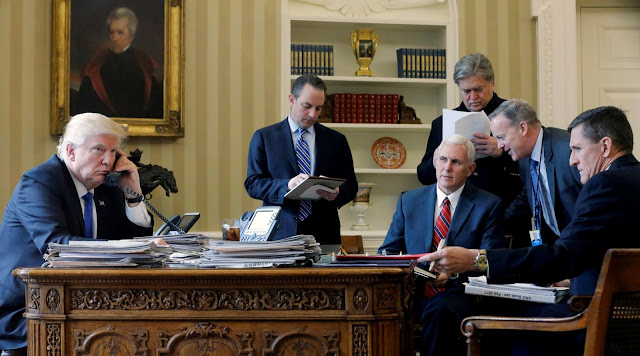What's all this about Flynn?
by digby

In case you were wondering what the significance of the Flynn news this week-end, this piece by former federal prosecutor Barbara McQuade will fill you in:
The report by the New York Times that Michael Flynn has withdrawn from a joint defense agreement with President Donald Trump might indicate that he is cooperating with Special Counsel Robert S. Mueller III. If so, this could be a significant turning point in the investigation.
First, what is a joint defense agreement? A joint defense agreement is a pact among attorneys for multiple targets or subjects in a criminal case in which they agree to share information. The agreement may be written or unwritten. Any joint defense agreement will be defined by its explicit terms, but generally, under such an agreement, attorneys have a duty to keep the confidences of all of the clients covered by the agreement. The attorneys also have a duty to avoid conflicts of interest as to any of the clients. The attorneys can compare notes, allocate work efficiently by dividing tasks and avoiding duplication, and develop a unified strategy.
The main advantage of joint defense agreements is that the information that they share is protected by a form of the attorney-client privilege, known by some courts as a joint interest privilege. These agreements can help targets or subjects sidestep the so-called “prisoner’s dilemma,” in which they must decide in a vacuum whether to help each other by remaining silent or betray each other by cooperating with authorities. When subjects or targets form a unified defense strategy, it is more difficult for prosecutors to “flip” targets, and use them as cooperators against their co-conspirators.
In the special counsel’s investigation, it has been reported that members of the administration have entered into a joint defense agreement. This makes sense because as they field requests from Mueller and his team for documents and interviews, they can work together to share the work and develop a unified defense strategy.
But what does it mean if Flynn has decided to withdraw from the defense agreement? It could mean that he and his attorney have decided that his interests have diverged from the other members of the agreement. Perhaps Flynn and his attorney have decided to pursue a different strategy. For example, they may decide against voluntarily turning over documents and instead to litigate disclosure issues in court. But such details can usually be worked out within the defense team. For that reason, it seems more likely that Flynn has withdrawn from the agreement because he has decided to cooperate with Mueller to provide truthful information and possibly testimony in exchange for leniency for any crimes of which he is convicted.
Recent reports suggest that Flynn has significant exposure to criminal prosecution. Mueller effectively fired a shot against Flynn’s bow when he charged Paul Manafort with violating the Foreign Agent Registration Act, among other offenses. Similarly, reports say that Flynn belatedly filed notice with the Department of Justice regarding his own lobbying work for the government of Turkey. Even more concerning, other reports indicate that Flynn participated in meetings to discuss the kidnapping and rendition to Turkey of cleric Fethullah Gulen from his refuge in Pennsylvania. Gulen is a rival of Turkish president Recep Tayyip Erdogan.
The congressional testimony of former acting Attorney General Sally Yates in May provides further evidence of criminal exposure for Flynn. Her testimony about Flynn’s contacts with Russians suggest that his conversations may have been intercepted by a wiretap authorized by the Foreign Intelligence Surveillance Court. This surveillance could yield a great deal of incriminating information about Flynn and his contacts with Russia on behalf of the Trump team. Yates was careful to protect classified information during her testimony, so we do not know all of the details about his conversations, but Yates testified that she was concerned that Flynn was “compromised.” If so, he could be charged with acting as an agent of a foreign government while serving as a U.S. government official.
Why was President Trump so intensely focused on protecting Michael Flynn?
You’ll recall that Flynn was supposedly fired because he lied to Vice President Pence about his contacts with Russian officials during the campaign and the transition, claiming he had only exchanged pleasantries with them when in fact they had discussed substantive policy matters, something Pence then repeated to the media. This was always an odd explanation for the firing. Even more odd was the fact that immediately, President Trump began telling anyone who would listen what a great guy Michael Flynn is and how unfair the whole mess was to him.
Given that Trump is not known for being loyal to those who work for him, that was rather curious. Donald Trump looks out for Donald Trump, and if you become a liability to him, he’ll very quickly start acting as though he barely knew you. Now consider what Trump proceeded to do with regard to Michael Flynn:
The day after Flynn resigned, Trump asked FBI Director James B. Comey to stop investigating the former national security adviser. “I hope you can let this go,” Comey reported Trump saying in a memo he wrote immediately after their meeting.
Trump asked Director of National Intelligence Daniel Coats to intervene with Comey to get him to back off his investigation of Flynn.
Unlike with previous aides who have displeased him, after he fired Flynn, Trump made a very public show of praising him to the media.
Months after Flynn was fired and as the investigation was accelerating, Trump kept in contact with Flynn. “I just got a message from the president to stay strong,” Flynn told friends at a dinner in April.
In May, Trump scolded his staff for criticizing Flynn to the media and had his spokesmen issue statements lavishly praising Flynn.
It’s almost as though Trump wanted to make sure Flynn didn’t turn on him.